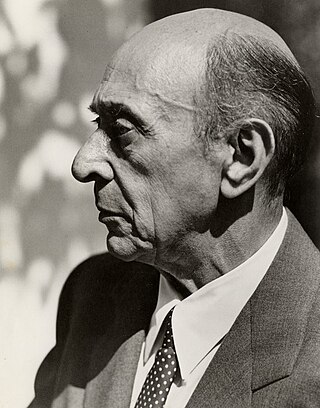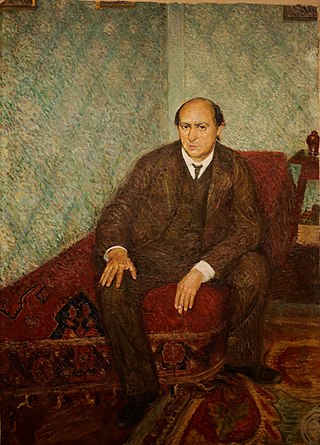
Arnold Schoenberg or Schönberg was an Austrian and American composer, music theorist, teacher and writer. He was among the first modernists who transformed the practice of harmony in 20th-century classical music, and a central element of his music was its use of motives as a means of coherence. He propounded concepts like developing variation, the emancipation of the dissonance, and the "unity of musical space".

The Second Viennese School was the group of composers that comprised Arnold Schoenberg and his pupils, particularly Alban Berg and Anton Webern, and close associates in early 20th-century Vienna. Their music was initially characterized by late-Romantic expanded tonality and later, a totally chromatic expressionism without a firm tonal centre, often referred to as atonality; and later still, Schoenberg's serial twelve-tone technique. Adorno said that the twelve-tone method, when it had evolved into maturity, was a "veritable message in a bottle", addressed to an unknown and uncertain future. Though this common development took place, it neither followed a common time-line nor a cooperative path. Likewise, it was not a direct result of Schoenberg's teaching—which, as his various published textbooks demonstrate, was highly traditional and conservative. Schoenberg's textbooks also reveal that the Second Viennese School spawned not from the development of his serial method, but rather from the influence of his creative example.
Arnold Schoenberg's Piano Concerto, Op. 42 (1942) is one of his later works, written during his exile in the United States. It consists of four interconnected movements: Andante, Molto allegro, Adagio, and Giocoso. Around 20 minutes long, its first performance was given on February 6, 1944, at NBC Orchestra's Radio City Habitat in New York City by Leopold Stokowski and the NBC Symphony Orchestra with Eduard Steuermann at the piano. The first UK performance was on 7 September 1945 at the BBC Proms with Kyla Greenbaum (piano) conducted by Basil Cameron. The first German performance took place at the Darmstadt Summer School on 17 July 1948 with Peter Stadlen as the soloist.

Verklärte Nacht, Op. 4, is a string sextet in one movement composed by Arnold Schoenberg in 1899. Composed in just three weeks, it is considered his earliest important work. It was inspired by Richard Dehmel's poem of the same name and by Schoenberg's strong feelings upon meeting his future wife Mathilde Zemlinsky, who was the sister of his teacher, Alexander von Zemlinsky (1877–1942). Schoenberg and Zemlinsky married in 1901. The movement can be divided into five distinct sections which refer to the five stanzas of Dehmel's poem; however, there are no unified criteria regarding movement separation.

Pelleas und Melisande, Op. 5, is a symphonic poem written by Arnold Schoenberg and completed in February 1903. It was premiered on 25 January 1905 at the Musikverein in Vienna under the composer's direction in a concert that also included the first performance of Alexander von Zemlinsky's Die Seejungfrau. The work is based on Maurice Maeterlinck's play Pelléas and Mélisande, a subject suggested by Richard Strauss. When he began composing the work in 1902, Schoenberg was unaware that Claude Debussy's opera, also based on Maeterlinck's play, was about to premiere in Paris.

Erwartung (Expectation), Op. 17, is a one-act monodrama in four scenes by Arnold Schoenberg to a libretto by Marie Pappenheim. Composed in 1909, it was not premiered until 6 June 1924 in Prague conducted by Alexander Zemlinsky with Marie Gutheil-Schoder as the soprano. The opera takes the unusual form of a monologue for solo soprano accompanied by a large orchestra. In performance, it lasts for about half an hour. It is sometimes paired with Béla Bartók's opera Bluebeard's Castle (1911), as the two works were roughly contemporary and share similar psychological themes. Schoenberg described Erwartung, saying "the aim is to represent in slow motion everything that occurs during a single second of maximum spiritual excitement, stretching it out to half an hour."
The Austrian composer Arnold Schoenberg published four string quartets, distributed over his lifetime: String Quartet No. 1 in D minor, Opus 7 (1905), String Quartet No. 2 in F♯ minor, Op. 10 (1908), String Quartet No. 3, Op. 30 (1927), and the String Quartet No. 4, Op. 37 (1936).

A Survivor from Warsaw, Op. 46, is a work for narrator, chorus and orchestra by the Los Angeles–based Austrian composer Arnold Schoenberg, written in tribute to Holocaust victims. The main narration is written in Sprechgesang style, between speaking and singing; "never should there be a pitch" to its solo vocal line, wrote the composer.

Von heute auf morgen is a one act opera composed by Arnold Schoenberg, to a German libretto by "Max Blonda", the pseudonym of Gertrud Schoenberg, the composer's wife. It is the composer's opus 32.

Moses und Aron, known in English as Moses and Aaron, is a 1975 film by the French filmmaking duo of Jean-Marie Straub and Danièle Huillet based on the unfinished opera of the same title by Arnold Schoenberg. During its 1975 run at US festivals, it was also known as Aaron and Moses, and was frequently reviewed as such.

The Five Pieces for Orchestra, Op. 16, were composed by Arnold Schoenberg in 1909, and first performed in London in 1912. The titles of the pieces, reluctantly added by the composer after the work's completion upon the request of his publisher, are as follows:

The Book of the Hanging Gardens, Op. 15, is a fifteen-part song cycle composed by Arnold Schoenberg between 1908 and 1909, setting poems of Stefan George. George's poems, also under the same title, track the failed love affair of two adolescent youths in a garden, ending with the woman's departure and the disintegration of the garden. The song cycle is set for solo voice and piano. The Book of the Hanging Gardens breaks away from conventional musical order through its usage of atonality.

The Edlen von Webenau are a family from Austria.

Julie von Webenau was a German-Austrian composer.
Paul August von Klenau was a Danish-born composer who worked primarily in Germany and Austria.

Josef Rufer (1893–1985) was an Austrian-born musicologist. He is regarded as a significant figure mainly on account of his association with and writings on Arnold Schoenberg.

Alexander Zemlinsky or Alexander von Zemlinsky was an Austrian composer, conductor, and teacher.
Gertrud Bertha Schoenberg was an Austrian opera librettist. She was the second wife of Austrian composer Arnold Schoenberg, whom she married in 1924, and the sister of his pupil, the violinist Rudolf Kolisch.

Zwei Klavierstücke, Op. 33, also known as Zwei Stücke, or in English as Two Piano Pieces and Two Pieces, is a composition for piano by Austrian composer Arnold Schoenberg. They were composed between 1928 and 1931 and were Schoenberg's last works for solo piano.
Richard Hoffmann was an American composer, musicologist and educator. He served many years as a professor at Oberlin Conservatory of Music.











